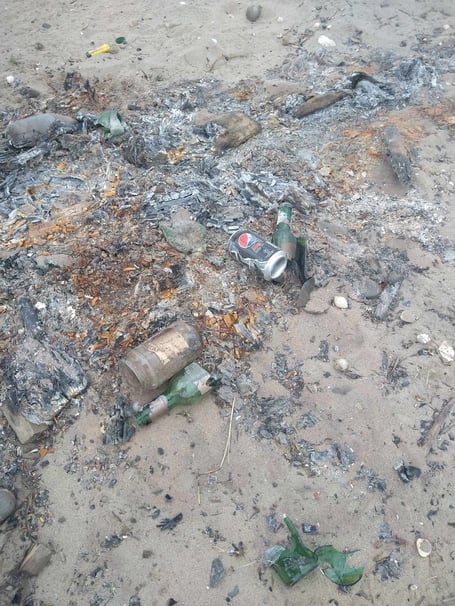A bonfire, vehicle tracks, glass bottles and rubbish left in an area sealed off to protect endangered birds' nests in Ynyslas has prompted an appeal for CCTV to trace those responsible.
Staff at the centre, managed by environmental regulator Natural Resources Wales (NRW), said the 'pillocks’ who uprooted fencing and drove a vehicle through the middle of the conservation area to set up a bonfire could have undone their work to protect ringed plover eggs during the nesting season.
The remains of the fire were discovered by staff on Sunday morning (25 June) in a location where nests were known to be.
Ynyslas is part of the Dyfi National Nature Reserve – a Site of Special Scientific Interest recognised by conservation body UNESCO as one of only 738 biospheres in the world.
The area on the north side of the nature reserve has been off limits since May in a bid to protect the endangered ringed plovers – a species which is on the Royal Society for the Protection of Birds’ (RSPB) red list of most threatened.
Staff say the perpetrators have committed a serious wildlife crime as bird nests are protected under the Wildlife and Countryside Act 1981.
The RSPCA says people can be jailed for up to six months if found guilty of an offence.
A visibly emotional Andrea Price, technical support worker at visitor centre, said: “It’s heartbreaking. We’ve spent two months trying to protect them and for some pillocks to just undo that...
“It’s sealed off so much that they’ve uprooted the posts and then had a bonfire and a barbeque and left bottles strewn everywhere.
“I just don’t understand it. There’s a whole area they could have gone to – and they choose there!
“All on purpose because they’ve taken the fencing down. There are oyster catchers nesting too.
“I understand someone has witnessed it. There are people who are prepared to make a statement apparently. They saw it all and described some of the vehicles.
“We need to get registrations and get CCTV footage – and we’ve got a timeframe. So hopefully we can find them.
“They’re (ringed plovers) quite rare little birds and they’re beautiful. They nest in the stony area, and they feed on the tide coming in and out.
“We had a nest that was about to fledge we think – and they’re old enough to survive that – but we had another which was only a week old.”
The nests are in the sand and are completely exposed.
She added that it is also the first time in 25 years there have been oyster catcher chicks in the sand dunes.
Along with the images, a staff member posted on Facebook said: “Not something we like to find in the morning.
“We're just hoping that the ringed plover eggs had already hatched.
“There was a nest just by this fire if anyone knows anything, or if a local business has CCTV footage of the road overnight, send us an e-mail on [email protected].
“These birds are so, so few in number it's completely depressing to us on the reserve who work hard to protect them.”
The RSPCA website states: “Many people are unaware of the legal protection that birds, their nests, eggs and young have and what action they can legally take.
“However, reckless building work, tree-felling or hedge-cutting at the height of the nesting season can leave people facing prosecution.
“Anyone found guilty of an offence could be given a maximum penalty of six months' imprisonment and an unlimited fine, which can be imposed in respect of each bird, nest or egg affected.”





Comments
This article has no comments yet. Be the first to leave a comment.